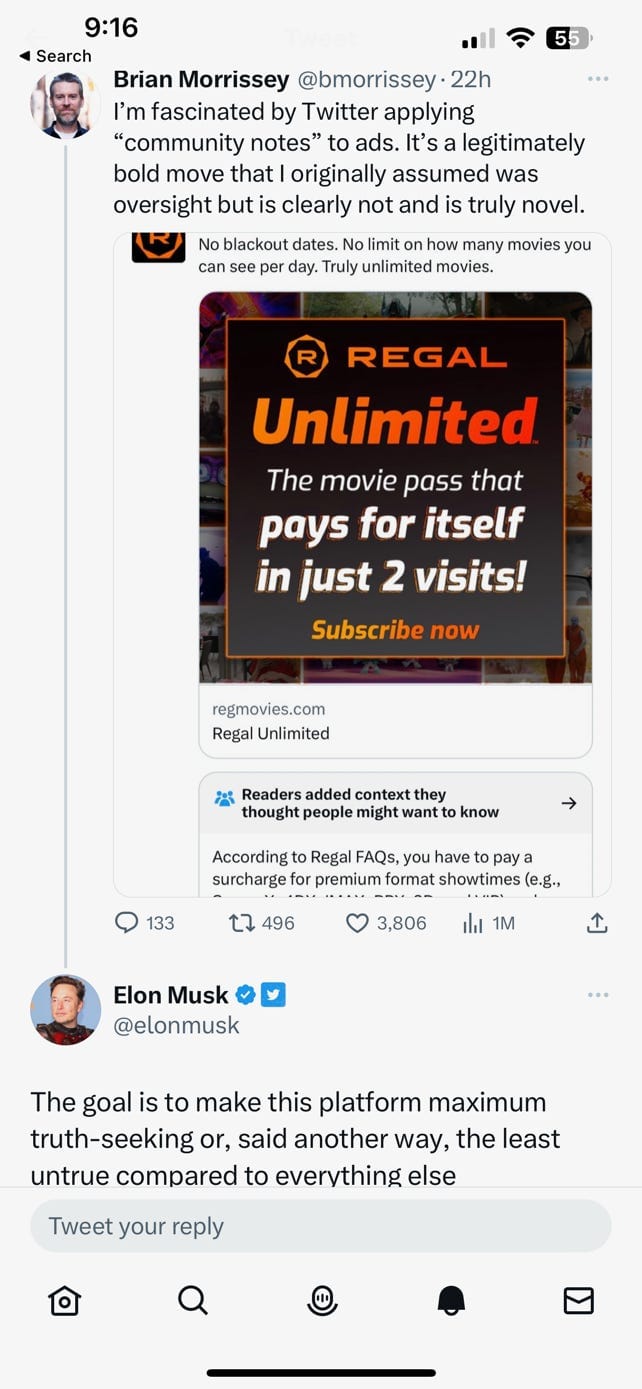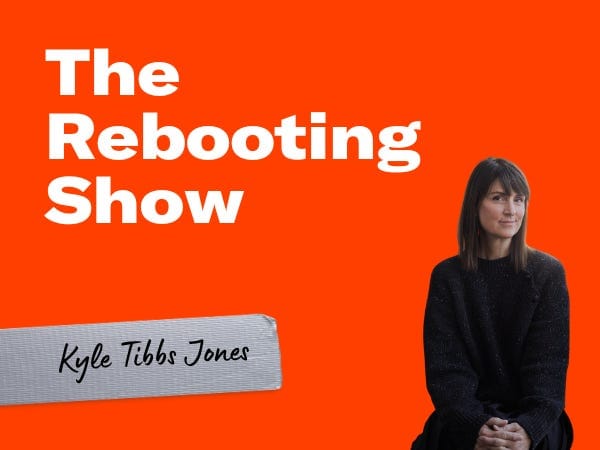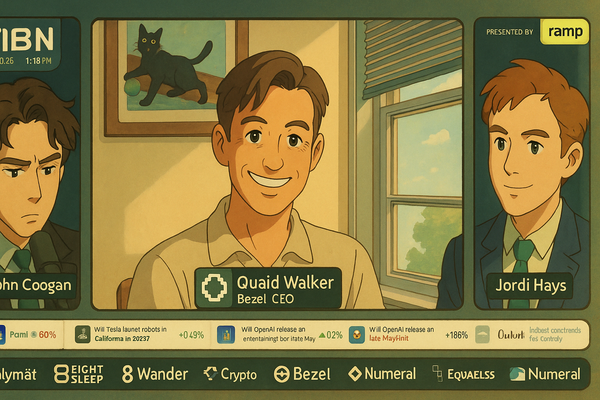Elon Musk: Web 2.0 man
Attaching “community notes” to ads is a return conversational advertising

Hi,
Thanks for reading. Quick reminder: If you’re decamping to the Riviera for the Cannes Lions, sign up for an invite to “The New Attention Economy,” three days of conversations The Rebooting is doing in partnership with Kerv. I’m also finalizing a cocktail gathering and an executive dinner at a fancy place in the hills above Cannes. Sign up here.
Elon Musk wants to bring “truth” to ads
Facebook’s first foray into advertising was in November 2007. The glitzy launch event featured a still-awkward Zuckerberg declaring advertising would be done differently than it had for the past 250 years. Facebook was promising to upend advertising by adopting the Web 2.0 ethos in the water at the time and making ads more user directed by showing to their friends when they took an action like signed up for an event or liked a brand. “Marketers are going to be part of the conversation,” he said. The goal was to make ads more like a “trusted referral.”
This was a time of optimism that the initial dreary period of banners, buttons, pop-ups and pop-unders, and invasive “rich media” intrusions with names like FatBoy, Eyeblaster and Superstitial would give way to a touchy-feely approach that would see advertisers “join the conversation.” Zuckerberg sang from this hymnal, saying Facebook’s approach amounts to “trusting people over ads.” It was a more kumbaya vision of personalization.
Facebook’s gauzy vision of ads didn’t last long. Soon after the event it became apparent that Facebook was not being forthcoming with how its Beacon feature would work, and it was playing fast and loose with consumer data. Go figure. Facebook quickly gave in on some utopian vision of digital ads and instead adopted hyper-targeting, fueled by its vast trove of data collected on users. Beacon may have failed in the short run, but its approach won out over conversational ads. Can’t say it was a terrible choice for Facebook and its shareholders.
But what’s old is new again. Something I’ve noticed on Twitter is how its “community notes” feature that appends context to popular tweets is sometimes applied to advertising. Initially, I assumed this was an oversight or a product manager pissed off about sleeping on a futon in his cubicle, but it turns out this is intentional. And the Big Man himself unlocked my final Twitter achievement badge by telling me so directly.

What I found interesting is Musk zeroing in on “truth” as the overarching goal, including advertising. That is a high bar. I believe what he’s getting at is similar to what Zuckerberg was promising – and failed to deliver – with Facebook’s social ads: a way to make advertising less one direction and more conversational. Twitter is a unique environment built on conversation, for better or worse, and the ads should follow suit. It’s all very 2007-2009.
In Web 2.0, the community ethos led to several efforts to remake digital advertising to be more conversational. Digg tried an ad system in which advertisers paid less based on positive ratings from users. Reddit adopted a similar system, allowing people to comment on ads. After all, people make decisions based on a variety of inputs, including what others say about a product or service. This was why so many companies worked so hard to make “word of mouth” marketing a thing. It was a hippie time, and Musk seems to gravitate to it. He has a point. Digital advertising has continued to rank well below analog ad methods in terms of trust. Social media is a particular challenge for advertising. The old saw has long been chat doesn’t monetize.
With community notes, Twitter is seeking a middle ground of allowing advertisers their say but highlighting further context to their message that’s contributed by users. You could argue this will make advertisers less, well, expansive with their claims, and also encourage engagement with ads that most people treat as annoyances. Judging from the flood of replies, this is a popular notion.
With his embrace of micropayments, conversational ads and odd fixation on “keywords,” Musk’s approach to advertising is like he was cryogenically frozen in 2009 and was just defrosted in the microwave. There’s a reason these hippie approaches to advertising never took off. Advertisers are just like us: They don’t want to pay to get told they’re full of shit.
But perhaps now is the time. The bargain of free access to content in exchange for exposure to commercial messaging worked relatively well pre-internet but has mostly broken in digital media. That’s because of the limitless nature of digital media, which has often led to a race to the bottom to see just how many ads you can jam on a page to hijack attention and maybe score some “fat finger” ad clicks, and an overreliance on data collection that causes people to wonder if Facebook is listening to them through their phones. Digital advertising regularly ranks low in consumer trust ratings.
AI is coming, and will bend perceptions of what is real and what’s not. The general distrust that pervades society will certainly be heightened. ChatGPT and the many AI tools coming online will remove much of the friction upon which advertising is built. The shift to a conversational interface, the subject of a new episode of the People vs Algorithms podcast coming on Thursday, will change advertising. Static ads with bland claims will need to change with people’s expectations, particularly as AI agents work on our behalf to accomplish tasks and people sensibly outsource the annoying task of sorting through the dozens of mattress comparison sites.

I’m a believer in a more conversational approach to advertising. It fits well with the ethos of newsletters. I had a conversation with Matt Keiser, CEO of LiveIntent, and asked his view on how should publishers deal with Apple masking email addresses.
Market adoption of masked email addresses is similar to market adoption of ad-blockers. There is a vocal audience of power users who adopt it, and they should have that right! But the vast majority of consumers accept the value that a Publisher brings to their lives and wants a direct relationship with the Publisher.
In the aftermath of Apple’s rollout of ITP, institution of Mail Privacy Protection LiveIntent has worked with publishing brands to mitigate data loss, including cross-site tracking and open signal. We’ve helped Publishers replace some of the data lost by providing technology to enable them to capture and structure their unstructured first-party data at the intersection of marketing and advertising (email, web, and mobile). This lets them continue to deliver revenue.
Publishers should continue to create content that readers raise their hands and ask for, while implementing technology that helps them control their destiny.
Learn more about how LiveIntent helps publishers win with email.

The Bitter Southerner began as a passion project for a group of natives to the South who were, well, a bit bitter about how it was often caricatured or reduced to its historical legacy as the birthplace of American slavery. That’s a past that is unfortunately still alive and is an indelible part of the American story. The Bitter Southerner confronts such issues head on but while telling a more nuanced and expansive story of this unique and yes complicated part of the world.
Kyle Tibbs Jones, a co-founder of the publisher, joined me to discuss the decade-long effort to build a sustainable, independent publication. Check out the episode on Apple, Spotify or wherever you listen to podcasts.
Appreciate the support from Impact.com by sponsoring The Rebooting Show. Check out “The State of Commerce Content” report done in conjunction with Digiday.
Thanks to LiveIntent for sponsoring this edition of The Rebooting. Check out how LiveIntent helps companies win with email.
Get in touch if you want to discuss sponsorship options to have a conversation with over 15,700 publishing professionals. My email is brian@therebooting.com.




